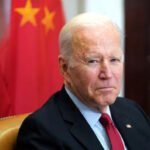
GENEVA (AP) — China’s top U.N. envoy said Beijing remains “firmly opposed” to the release of a long-anticipated report about Xinjiang from the office of U.N. human rights chief Michelle Bachelet, just hours before her self-imposed deadline for its publication was set to expire Wednesday — her last day on the job.
Ambassador Zhang Jun said China had repeatedly told Bachelet, whom China welcomed in May for a trip that included a visit Xinjiang, that Beijing did not want the report to be released — and echoed a string of Chinese claims that Western pressure on her was to blame if the report does get out.
“We haven’t seen this report yet, but we are completely opposed to such a report, we do not think it will produce any good to anyone,” Zhang told reporters outside the Security Council. ”We have made it very clear to the high commissioner and in a number of other occasions that we are firmly opposed to such a report.”
“We all know so well that the so-called Xinjiang issue is a completely fabricated lie out of political motivations, and its purpose is definitely to undermine China’s stability and to obstruct China’s development,” he added.
Beijing’s demands to keep a lid on a report have fanned a tug-of-war for diplomatic influence with the West over the rights of the region’s native Uyghurs and other predominantly Muslim ethnic groups.
The report, which Western diplomats and U.N. officials said was all but ready for months, was unlikely to plumb significant new ground beyond the string of findings from independent advocacy groups and journalists who have documented concerns about human rights in Xinjiang for years.
But Bachelet’s report comes with the imprimatur of the United Nations, and the member states that make it up. The run-up to its release fueled a debate over China’s influence at the world body and epitomized the diplomatic chill between Beijing and the West over human rights, among other sore spots.
Bachelet said in recent months that she received pressure from both sides to publish – or not publish – the report and resisted it all, treading a fine line all the while noting her experience with political pressure during her two terms as president of Chile.
In June, Bachelet said she would not seek a new term as rights chief, and promised the report would be released by her exit date on Aug. 31. That led to a swell of back-channel campaigns — including letters from civil society, civilians and governments on both sides of the issue.
She hinted last week her office might miss her deadline, saying it was “trying” to release it before her exit.
Over the past five years, the Chinese government’s mass detention campaign in Xinjiang swept an estimated 1 million Uyghurs and other ethnic groups into a network of prisons and camps, which Beijing called “training centers,” but former detainees described as brutal detention centers.
Beijing has since closed many of the camps, but hundreds of thousands of people continue to languish in prison on vague, secret charges.
___
Lederer reported from the United Nations.




